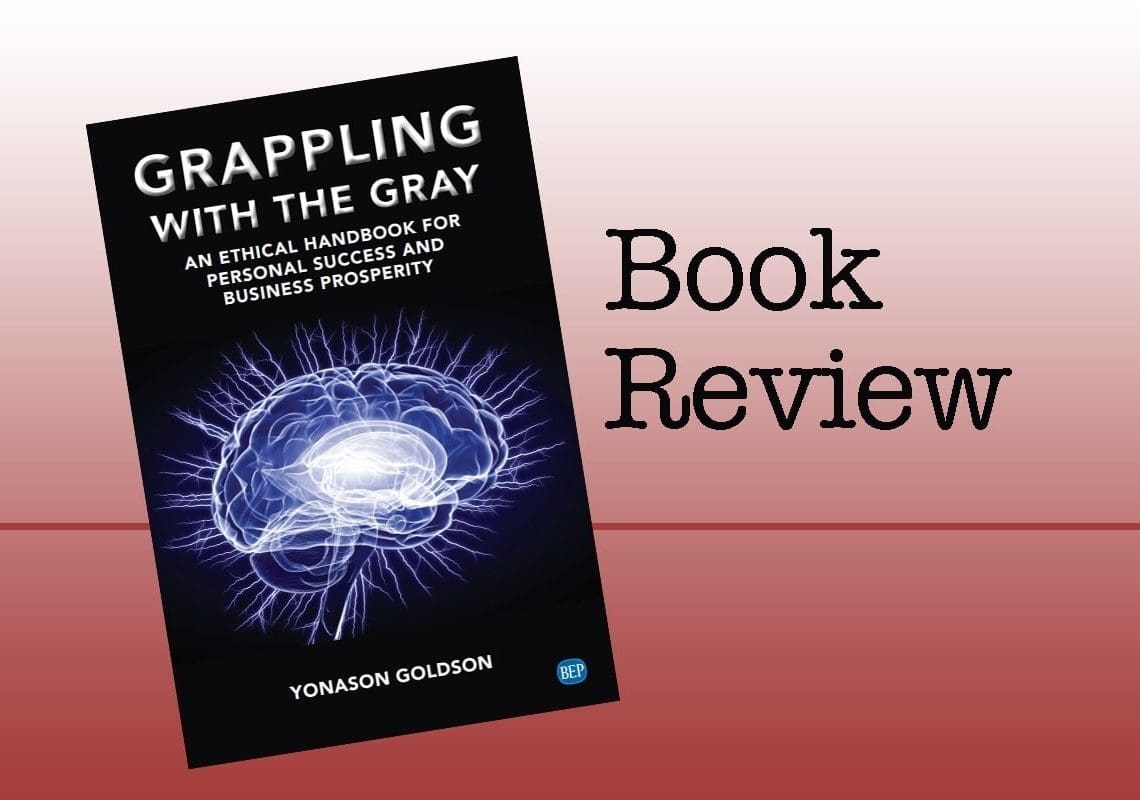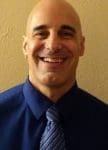Michael Toebe reviews Yonason Goldson’s book, “Grappling with the Gray: An Ethical Handbook for Personal Success and Business Prosperity,” a collection of case studies intended to ignite thoughtful consideration of ethical dilemmas.
When I learned of a new book on ethics and saw the title “Grappling with The Gray: An Ethical Handbook for Personal Success and Business Prosperity,” my interest was commanded. I wondered, however, if it might turn out to be a very dry, tedious, indulgent, scholarly examination and read on the topic (snore). It wasn’t.
Whether it succeeds on its claim of helping the reader achieve a higher level of success and prosperity will be determined by each reader, yet author Yonason Goldson delivers an easy-to-read, interesting piece of work that will grab your attention, keep it and make you think about ethics in different parts of your life and society.
So, who is Goldson, and why is he writing about ethics? He describes himself as a “hitchhiker, world traveler, high school teacher, newspaper columnist and rabbinic scholar.” He’s also the Director of Ethical Imperatives, does keynote speaking on the ROI of Ethics, teaches the “Ethical Leadership Masterclass” series and has also written “Fix Your Broken Windows, A 12-Step System for Promoting Ethical Affluence.”
Ethics is an abstract term to a large part of the population, yet nearly everyone realizes when it’s not present in their own lives – and when they see it missing from observing the news.
Ethics is vitally important to personal, professional, organizational and political well-being, yet it is usually only interesting to learn about when it is done in a conversational manner. Scholarly works on the subject are far less interesting and engaging. Goldson, however, overcomes that common trap.
A One-on-One Course in Ethics
I found the strengths of the book to be in the wide range of ethical situations and dilemmas presented and the brief list of quality questions asked after these stories, inviting the reader to reason through their decision-making from different perspectives.
This is a thinking person’s book, yet it’s not what I’d call “work.” It’s meant to inform, yes, but also to inspire the reader to interact with the author. Goldson values your analysis and opinion and wants you to engage in expansive thinking, a rare exercise these days.
This jibes with Goldson’s background as a teacher. In a sense, you are in a one-on-one class as he poses questions about your observations, interpretations and reasoning. It’s not a test, though. It’s Goldson’s plan to inspire deeper thinking for the purpose of learning. In this way, there is real value to be gained from participating in the brief exercises he offers.
Some might wonder why this approach is necessary to becoming better informed and learned. “Our brains are lazy,” Goldson writes. “That’s why we repeat the same behaviors over and over, even when we know they aren’t productive, and even when we know they’re counterproductive. We take comfort in familiarity, which makes us feel better by convincing us that we have the business of life well in hand.”
In the book’s five sections, Goldson attempts to walk us through the areas where our ethics can be tested: Ethical Relationships, Ethical Business, Ethical Education, Ethical Society and Ethical Headlines. His conviction is that “only by developing the muscles and dexterity of conscience will we achieve the moral fitness necessary to make the right decisions when confronted by situations of ethical challenge.”
The author shares infrequent bits of rabbinical wisdom from his mentors; they’re practical and incorporated into the conversation about ethics, yet not all readers may appreciate or be able to tolerate them. If you read movie or book reviews, you’ll find many reviewers unhappy with any consistency of a religious or spiritual thread in the work. “Grappling with the Gray,” however, is not a religious book; even the most cynical couldn’t find it as such.
The Case for Developing One’s Ethical Mind
It’s vital for us to increase our ethics and to show moral courage in the face of danger. We think of ourselves as ethical, but so does almost everyone else – though the world and the news reveal otherwise. In truth, we often operate on a slippery slope of rationalization and self-interest. Goldson has noticed this, and he knows we have to work at developing our ethical mind and behavior.
“Every time we struggle toward moral clarity, we make ourselves better equipped to tackle the next moral challenge that comes along,” he writes.
The human mind and its psychology believe that ethics and our goals can too frequently be at odds with each other, an assumption that Goldson finds preposterous. “In contrast to the poisonous misconception that we have to choose between being good and being successful, a growing body of research supports the truism that good ethics is good business, that we succeed through commitment to values and that taking responsibility for the impact our actions have on the world around us and those who share it is the key to creating a vibrant and healthy society in which we can all flourish,” he asserts.
He sees our human frailties, and that is one big inspiration for his work. “In a world that is becoming increasingly self-absorbed, this is a message that I believe is desperately needed,” Goldson says.
I found “Grappling with the Gray” to be an easy page-turner because of the stories, author analysis and questions to promote thought and learning. If that sounds like a recipe for ethics you’d like to try, I recommend the book.
If examining your professional and personal ethics is uncomfortable or uninteresting, or if you might feel offended by having to provide reasons from alternative angles of an issue, the book likely won’t appeal to you. If you might be turned off by the author’s personal view on ethical situations or the small-bite philosophical wisdom by Goldson’s religious mentors peppered throughout the book, maybe you will want to pass on reading it. I’m not Jewish, and I didn’t find it bothersome at all.
Would I read this book again? Yes. Would I recommend it in confidence to my professional and personal connections? Yes.
I found one comment of Goldson’s in particular to be a smart takeaway when it comes to ethical situations (especially the most challenging ones): “Demand the same intellectual integrity from yourself that you demand from others.”



 Michael Toebe is a reputation specialist who serves individuals and organizations. He regularly writes on communication, ethics, governance, conflicts, scandal, reputation and crisis. He is the writer of "Red Diamonds Essays" and "Reputation Specialist Essays," both on the Medium platform.
Michael Toebe is a reputation specialist who serves individuals and organizations. He regularly writes on communication, ethics, governance, conflicts, scandal, reputation and crisis. He is the writer of "Red Diamonds Essays" and "Reputation Specialist Essays," both on the Medium platform. 








